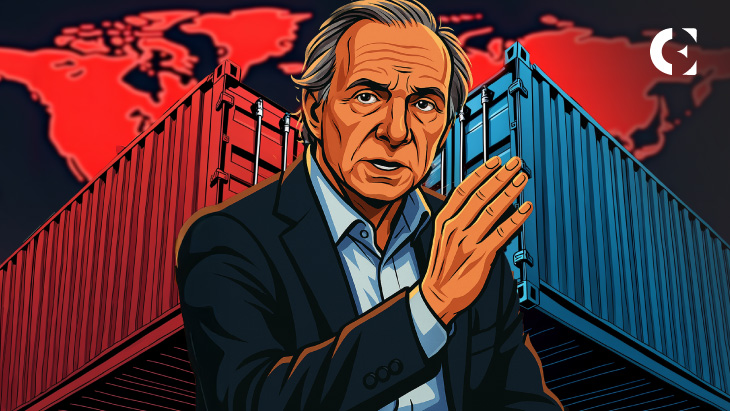- Dalio says tariffs reflect deeper cracks in the global order.
- He warns of instability in U.S. debt, political gridlock, and rising global tension.
- The world is shifting from cooperation to confrontation, with high economic stakes.
Billionaire investor Ray Dalio issued a stark warning about the global economy. He argued, in his latest commentary, that focusing solely on U.S. tariffs misses the larger, underlying structural problems.
He identified rising debt, internal U.S. division, and global power shifts as key signs the current world order is under significant pressure.
Dalio: Tariffs Are a Symptom, Not the Disease
Dalio cautioned against fixating on tariffs as the root cause of market volatility. He views them not just as policy tools but as signals of more profound economic stress.
The long-standing trade imbalances, particularly between the U.S. (running persistent deficits funded by borrowing) and export-reliant nations like China (which helps finance U.S. debt), are becoming unsustainable, Dalio argued.
As geopolitical tensions rise, nations increasingly prioritize self-interest over global cooperation. “These actions reflect deeper fractures,” Dalio explained. “They’re not standalone events.”
Underlying U.S. Economic and Political Weaknesses
Dalio also expressed concern about the hollowing out of America’s industrial base. Decades of globalization have shifted manufacturing abroad, leaving the U.S. reliant on imports.
In response, recent tariff policies aim to restore domestic production, but Dalio believes they reveal broader structural issues.
Related: Tariffs Hit Crypto via Sentiment; Core BTC Holders Won’t Sell – Analyst
He also highlighted the growing gap between U.S. government spending and revenue. The country’s economic foundation is under strain with rising national debt and limited fiscal flexibility. “Debt is becoming harder to manage,” he said. “We’re nearing the limits of what monetary policy can fix.”
Rising Political Division Inside the U.S.
Compounding economic strains, Dalio described internal political polarization and widening social gaps (income, education, opportunity) within the U.S.
These divisions, he said, are making it difficult for leaders to reach a consensus on major issues, including fiscal policy, trade, and national security.
Beyond the U.S., Dalio warned that the world is entering a new phase of geopolitical competition. The long-standing U.S.-led global order is shifting toward one defined by rivalries, particularly between the U.S. and China.
Trade disputes, military build-ups, and technology races are replacing cooperation with confrontation. He believes this transition could reshape global alliances, markets, and stability. Ultimately, Dalio encouraged policymakers and investors to study past economic and political cycles for clues about the future.
Related: Engineered Recession Response? Theory Swirls as Tariffs Send Markets Reeling
Bitcoin’s Haven Role Debated in Shifting Order
Within this volatile macro landscape, Bitcoin’s role as a potential haven is being debated, especially as it fluctuated during the market crash but rebounded after a dip. While Bitcoin has shown volatility alongside stocks, some argue it could still become more attractive as a store of value during uncertain times, similar to gold.
Previous economic downturns have significantly increased Bitcoin adoption. During the 2020 COVID market crash, Bitcoin initially followed the downward trend of stocks but later surged to new all-time highs.
Disclaimer: The information presented in this article is for informational and educational purposes only. The article does not constitute financial advice or advice of any kind. Coin Edition is not responsible for any losses incurred as a result of the utilization of content, products, or services mentioned. Readers are advised to exercise caution before taking any action related to the company.







